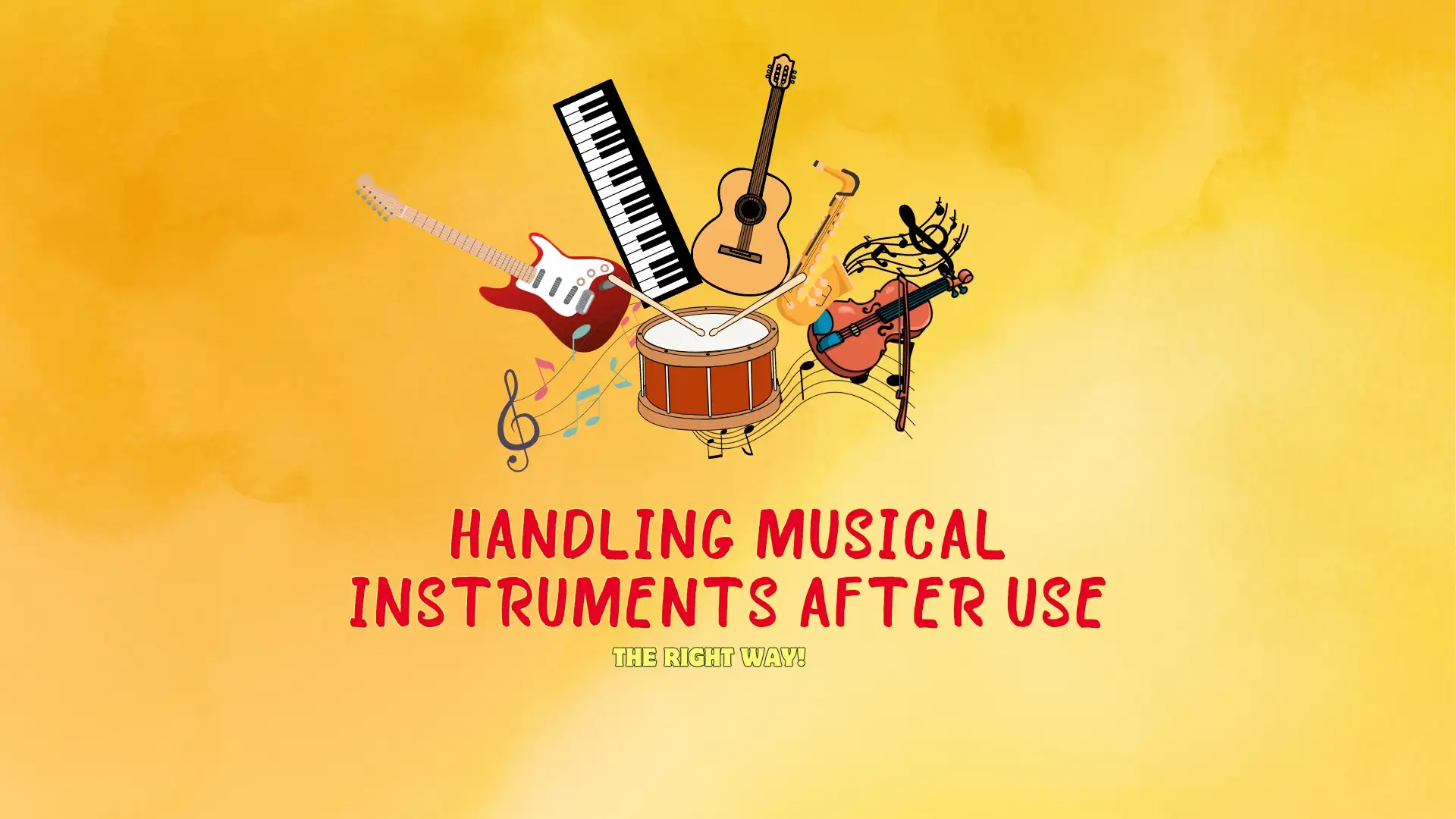Care, Tips, and Maintenance Guide
To all the musicians there, whether you are a novice or a seasoned musician, understanding Handling musical instruments and maintaining it correctly is crucial. Musical instruments are not only tools for creating mesmerizing melodies but also delicate pieces of craftsmanship that require proper care and maintenance. In this blog, we will learn more about handling musical instruments the right way with some tips and care for a variety of popular instruments.

Musical instruments go beyond being tools; they serve as extensions of our minds enhancing our capacity to convey the melodies of our innermost selves.
Guitar Care Tips
Cleaning: Keep wiping your guitar regularly with a soft cloth to remove dust and fingerprints. You can get guitar polish in online stores or musical instrument stores which are specially designed for the instrument’s finish, to keep it looking shiny and new.
String Maintenance: Keep replacing your guitar strings regularly with a soft cloth, as they are worn and lose their tone over the period. Keep your guitar clean by wiping with a cloth after each use, and use a string cleaner to remove any grime build-up.
Humidity Control: Keep away your guitar from direct sunlight and extreme temperature changes. Always use a guitar humidifier to maintain humidity levels as during harsh and dry climates it will help the guitar from cracking or warping.
Adjustment: Regularly check the bridge and neck of your guitar for any signs of misalignment or bowing. Take your instrument to any professional service provider if required for any adjustment.
Piano Care Tips
Tuning: With the help of any professional, tune your instrument regularly to have a better sound. At least try tuning once a year. For pianos in harsh climatic conditions one may need to tune it frequently.
Cleaning: Dust the exterior part of the piano regularly with a soft cloth using any gentle cleaner specially designed for piano finishes. Do not use any water or harsh chemicals as they may damage the wood finish.
Key Care: Do not have moisture between the keys. Use a cleaner to remove any stubborn stains or dirt.
Regulation: Adjust your piano’s mechanical parts. Regulate the piano by any professional technician.
Violin Handling Techniques
Storage: Protect your violin from dust, moisture, or any physical harm, keep your violin in a case when not in use. After using the instrument gently clean the instrument with a cloth to avoid fingerprints or residue.
String Care: For a better and clearer violin sound, use a tuner for pitch tweaks. Do not tighten the strings much as they could harm your instrument.
Bow Maintenance: Clean your violin bow frequently using a clean soft cloth to maintain the hair and get rid of any residue if any . After each use, loosen the bow hair a little to avoid getting it tensed and its flexibility.
Bridge and Soundpost: Always remember to check the bridge and soundpost placement, in case of any strange sounds or sensations, then you should take your instrument to a luthier and get it fixed.
Drum Maintenance Tips
Cleaning: Clean your hardware, drum shells, and cymbals after each use with a soft cloth to remove any sweat, oil, and dirt. You can use a mild detergent to avoid using any sort of harsh chemicals as they can damage the finish of the instrument.
Tuning: Maintain drumheads for a clear sound and also use a drum key to make any minor adjustments to the tension of the lug. To check the even tension, tap around the edge of the drumhead.
Head Replacement: Replace your drum heads as and when they get worn or damaged. For the good sound quality of your drums, choose a quality head that matches the type and size of your drum.
Hardware Maintenance: Protect hardware to prevent any rust, corrosion, or damage. It is very important to take care of parts like tension rods, lugs, and mechanisms keeping it lubricated for the smooth functioning of the drums.
Flute Care Instructions
Cleaning: Make sure to clean your flute every time you play it. Use a cloth to wipe the outside and a flute cleaning rod and cloth for the inside. If there’s any dirt or residue, a bit of soap, with warm water should do the trick.
Key Maintenance: Maintain your flute keys clean and lubricated to prevent any sluggishness or stickiness. There is a key oil specially made for flute mechanisms. Remember, do not over-oil your flute as it can attract dirt or grime.
Pad Care: Keep a frequent check on the condition of your flute pads for any wear or damage. Replace damaged pads to maintain a tight seal or any air leaks.
Storage: To prevent any damage from moisture, and dust, store the flute in a protective case. You can get a padded flute bag or case cover for protection during harsh climate or external dirt.
Saxophone Cleaning Guide
Cleaning: To clean the saxophone, you should soak up the mouthpiece in soap and water for about 20 minutes. Then gently scrub it with a brush and wipe it down with soft tissue paper. Remember to brush gently; don’t overdo around the baffle, side rails, or tip where they are very fragile.
Maintenance: Lubrication is highly crucial. So, oil your saxophone keys to make them operate smoothly. You should go to an instrument repair shop nearby for this service.
Post-practice Care: The first step is removing the neck and mouthpiece while the other involves getting rid of the reed as well as ligature thereafter. Remove the moisture from the saxophone body with a cleaning swab and polishing cloth.
Storage: After drying the saxophone with a swab and cloth, store it in its case with the neck and mouthpiece detached. The case should be in a cool, dry place with a stable temperature.
Trumpet Care and Maintenance
Cleaning: Cleaning the mouthpiece regularly is crucial. Use a polishing cloth to remove fingerprints and dirt from the exterior. After every use remove the moisture by using the water keys. Wipe down and clean the mouthpiece or you can also deep clean it by soaking in warm soapy water.
Before Care: Remember to wash your hands and jewelry before playing your trumpet to avoid tarnishing the finish. Always brush your teeth before to prevent any bacteria buildup inside the trumpet. Further, keep the valves lubricated with oil and check the instrument regularly for any damage.
Key Tips: To prevent any bending, don’t stand the trumpet on its bell. Don’t force the mouthpiece in or out. If it is stuck, seek professional help. Don’t leave the trumpet in extreme temperatures.
Storage: Before storing the trumpet in the case, detach the mouthpiece gently. Avoid storing the trumpet with extra items in the case.
Clarinet Care Tips
Cleaning: Wipe down the exterior of the clarinet with a microfiber cloth. Pull a clarinet swab through the assembled instrument to remove moisture. Make sure you clean your mouthpiece after using it every time. You can get deep cleaning by using soap and warm water with a brush.
Key Maintenance Tips: Take off reeds from the mouthpiece after use and dry them out completely. Keep them inside a reed guard. Change reeds every one or two weeks or when they get worn out/damaged. For protection and easier assembly, apply cork grease on joints regularly.
Assembly: Assemble the clarinet starting from the bell upwards through twisting movements at lubricated joints. While joining these parts, press the bridge key on the top joint. Put moistened reed into place attached to the tightened ligature of the mouthpiece.
Storage: Always keep clarinets well in their cases to avoid extreme temperatures and humidity conditions that may harm them in any way.
Cello Handling Techniques
General Cleaning of a Cello: The bow hair on a cello contains a fine powdery dust called the rosin which settles on the cello’s belly while playing, and forms a layer on the strings. This layer, if left unattended, accumulates over time, and hardens. This will result in quality loss in vibration, which will result in poor quality of the sound produced from a cello.
Rubbing alcohol comes in handy here. Take a small amount of rubbing alcohol in a cloth, just enough for the cloth to dampen, and wipe down the strings. Repeat the process until the cloth stops accumulating dust with every wipe.

Did You Know?
Were you aware that the cello, which was initially called the violoncello, belongs to the violin family and is played using a bow? Its sound is both rich and adaptable covering a spectrum, which positions it as one of the emotive instruments in classical music.
While Traveling: If you are going to travel with a cello then carry it in an appropriate quality case; this will save you from any possible damages caused by improper transportation. To avoid unnecessary stresses when carrying it along, place it into a backpack or attach two straps or a harness so that weight distributes evenly but don’t just sling it across one shoulder.
Ukulele Maintenance Guide
Cleaning: Clean both the body and fretboard of your ukulele using a soft cloth. Strings can be wiped clean using a small soft brush Additionally, if you want it to shine use a specialized cleaning solution.
Restringing: Make sure you choose the new strings while keeping in mind your playing style and desired tone. To do the restringing, first remove old strings one at a time. Slowly unwind it to avoid tension on the neck. Now, start to string the ukulele with the A string first, and tune each string. Remember, new strings need frequent tuning initially as they stretch.
Maintenance: Maintain proper humidity to prevent drying or warping. Check regularly if there are any signs of wear and fix issues if any.
Storage: It is recommended to keep your ukulele in a quality case when you are not using it. Keep the ukulele case in a cool and dry place with a stable temperature.
Conclusion
These are some care tips and maintenance guides curated for our beginners or advanced players. By following the given care, tips, and maintenance guides for the top 10 instruments, we as a team of MUSIC MASTER assure you that your musical instrument will remain in excellent condition. Always remember to handle your instruments with the utmost care, keep them in a proper place, and have regular maintenance so they sound at their best.
No matter if you are strumming a guitar, or blowing into a saxophone. The tip for properly caring for your instruments and maintenance is that it will enhance the functionality so you can play it in the long run! Whether you are a novice or an advanced player, learn to play these instruments with our expert guidance only at MUSIC MASTER.
Check out the blog post to uncover some musical treasures! Delve into the world of ‘Unknown Musical Facts‘. Uncover unexpected revelations that will transform how you enjoy music. From tales, to anecdotes this exploration promises to deepen your passion for music.
FAQs
How do I take care of my guitar?
Clean and polish your guitar regularly, keep it humidified, and store it in a cover when not in use.
What are some tips for maintaining a piano?
Tune your piano regularly, wipe it with a clean cloth, and do not place it near heat or moisture.
How do I handle and store a violin properly?
Loosen the bow of the violin when you are not using it to prevent warping and store it in a protective case.
What are some maintenance techniques for drums?
Tuning the drum’s head, and hardware are some maintenance techniques that can prevent any damage.
How do I clean and care for a flute?
Clean your flute with a clean soft cloth, and store it in a cover after each use. Do not keep bare in harsh climates or any moisture.
What are the best practices for cleaning a saxophone?
The best practice for cleaning a saxophone is to do it with a swab or soft cloth and lubricate frequently.
How should I care for my Cello to keep it in good condition?
Handle it with your clean hands, avoid harsh temperatures, and secure it in a case to maintain its good condition.
Related blog: Music instrument name


























